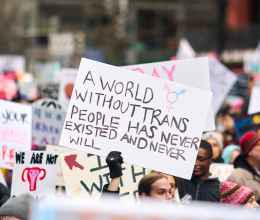
Twenty minutes from where I grew up, in Owasso, Oklahoma, Nex Benedict was relentlessly bullied for being trans. This bigoted aggression continued for more than a year and, last March, Nex died after being physically beaten in a school bathroom.
Nex is far from alone. According to a recent study by the Centers for Disease Control & Prevention one in four transgender youth missed school because they knew they were unsafe. A Department of Education (ED) investigation found that Nex’s experience was part of a routine negligence to prevent sex-based harassment in their school district.
Trans Day of Remembrance is an annual ceremony of mourning for the trans and gender non-conforming people whose lives were lost to anti-trans violence this year. In 2024, four of those lost were teenagers, like Nex. The youngest, Pauly Likens, was murdered at just 14. Memorializing our trans kindred we lost in the previous year started with the 1998 death of Rita Hester and, for 26 years, this day has served as a reminder of how vitally important it is that we remember those we’ve lost, and that we continue to fight for justice.
I started my advocacy doing reproductive justice organizing in Oklahoma, not far from where Nex grew up. At the core of reproductive justice is the fundamental belief that everyone has the right to decide if, when, and how they have children and the right to raise those children in a safe and healthy environment. In that work, I saw anti-abortion legislators in Oklahoma pursue countless policies that allowed the state to police our bodies, from abortion access to gender identity. It was that fundamental belief in autonomy — that my body is mine, and mine alone — helped me understand my own transness.
Trans individuals are policed because we bend expectations of gender when we inhabit public spaces like bathrooms, when we seek housing, relationships, and education. Social, political, and legal institutions continue to attempt to control our bodies and our lives. But it is this refusal of expectations, this insistence on the freedom to be ourselves, that makes us who we are. Right now, extremist politicians across the country are putting our lives at risk when they restrict access to abortion and gender-affirming care. Josseli Barnica died waiting for emergency abortion care. Trans youth and their parents have reported devastating interruptions in medically-necessary health care when politicians attempt to ban gender-affirming care. In one study, 70 percent of gender-affirming care providers reported receiving threats to their personal safety or their practice.
On this Trans Day of Remembrance, I can’t stop thinking about the important precedent the Supreme Court is about to set. On December 4, the Supreme Court will take up U.S. v Skrmetti, a case that would decide whether or not trans youth are protected by the Constitution. This case asks the court to decide whether Tennessee’s law banning gender-affirming hormone therapies for transgender minors violates the Equal Protection Clause. The ACLU is prepared to tell the court what we know is true: Trans people are protected by the Constitution, just like everyone else, and that includes our access to gender-affirming care.
My colleagues and I are working tirelessly for the right to live our lives with dignity and the right to choose what is best for our own bodies. But today, I am also grieving. In our grief, justice can feel like an abstract concept, but in our pain and anger is an understanding that, even when justice feels bloodless, injustice must still be stopped. The relentless political attacks on the LGBTQ community that seek to dehumanize us must be stopped. The lack of adequate medical care, shelter and mental health resources must be stopped.
Mariame Kaba reminds us that we should let our grief radicalize us rather than lead us to despair. It is not radical to want safety and justice for myself and my community — it is a fundamental right. Trans people deserve the freedom to be who we are.
Today, we mourn and honor those who we have lost. Tomorrow, we celebrate, support, and fight like hell for the trans and non-binary people who are still living.

